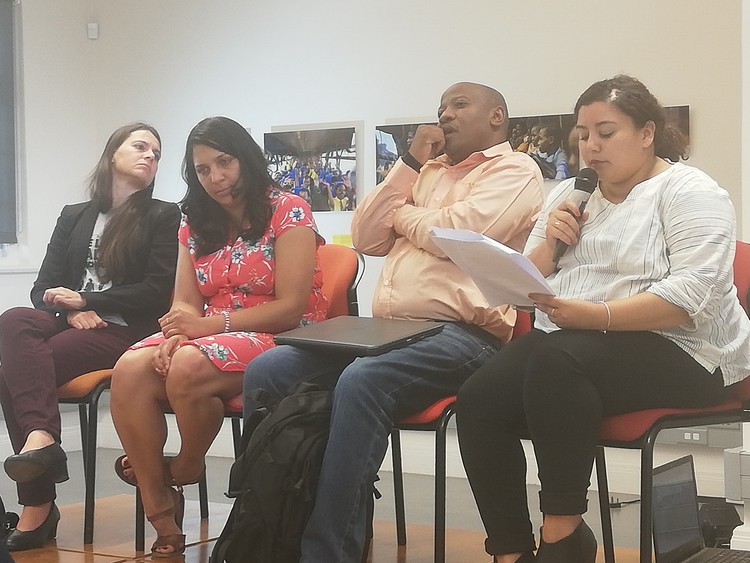
Demichelle Petherbridge, Lisa Draga, Katiso Mosioua and Amanda Rinquest presented at a panel to mark ten years of Equal Education’s struggle on Thursday. Photo: Thembela Ntongana
16 November 2018
“A perfect school for me … doesn’t have to be a fancy building, just a suitable environment for teaching and learning in every day,” said Equal Education Eastern Cape Head Amanda Rinquest at a panel discussion about the state of rural education in the country on Thursday.
Rinquest was reading a letter written by a student, Siphelele Qabaza in the Eastern Cape who attends one of the problem schools with bad infrastructure that Equal Education has identified.
“We never wanted much. We just want to feel the joy in our schools with no fear of falling structures and feel warm in classrooms with no broken windows … The National Department of Education complains about the pass rate in the Eastern Cape knowing that they do not give learners proper places to study,” Rinquest read from the letter.
The panel discussion was part of the closing night of Equal Education’s anniversary exhibition, “Qina Mfundi. Qina!”, at the Tshisimani Centre for Activist Education in Mowbray on Thursday, that celebrated Ten Years of Struggle for Equal Education. The panel discussed the challenges to quality teaching and learning in rural areas as well as on some of the successes for Equal Education in fighting for better education.
Rinquest said in the last three years there has been some improvement in the Department of Education in the Eastern Cape but says there are still systematic issues. “There are still large backlogs and information gaps,” said Rinquest.
GroundUp has written a number of stories on the conditions of schools in the Eastern Cape, with children using the field as toilets and some with snakes coming into their classrooms.
Rinquest said of the 5,000 schools in Eastern Cape, 197 have no water, 53 have no toilets, 2,127 only have pit toilets and 245 have no electricity.
“Now these are the numbers that [the Department of Basic Education] are proud of, I don’t know how they can be proud of the fact that there are schools where there is not a single toilet,” said Rinquest.
She said in many cases when they visit the schools they find different information than what the department provided.
The Department of Basic Education set Norms and Standards for South African school infrastructure in 2013, and provided its own deadline to fix the infrastructure standards by 2016, which it failed to meet. Equal Education campaigned against the missed deadline and when the department failed to engage Equal Education, it took the department to court. Equal Education won the case in the Bhisho High Court in July 2018.
“The 2016 date has come and passed, 2017 came and passed and the 2018 date has come and passed. There are still over 2,000 schools without toilets,” said Rinquest talking about the deadlines for the school norms and standards implementations.
Katiso Mosioua, a teacher at Chief Henry Bokleni High School in Libode, 34km from Mthatha, said they were happy with assistance from Equal Education which helped them get a state of the art school that was finished in June this year.
“In the previous school we experienced overcrowding with a class compliment of 98 students for one teacher, we had 1,500 students for 17 classes … It was difficult for teachers who had to mark 98 papers for one class and that affected the pass rate” said Mosioua.
He said they had not yet moved into the new school because there is no electricity, despite them having applied for it in 2014. He said the school is looking into getting generators so that the students can move into the new school in 2019.
Equal Education Law Centre attorney Demichelle Petherbridge spoke about the victories in advocating for scholar transport in KwaZulu-Natal since 2014. Equal Education had taken the department to court, asking that they provide scholar transport for 12 schools in Nquthu in rural KwaZulu-Natal.
On 7 November 2017, KwaZulu-Natal departments of education and transport promised in court that from 1 April 2018 all of the 12 schools would be getting transport.
“The rights to basic education includes the ability to actually have access to a school and that failure to provide scholar transport is a violation to the right to basic education,” said Petherbridge. “The state has a duty to provide scholar transport as part of its constitutional mandate.”